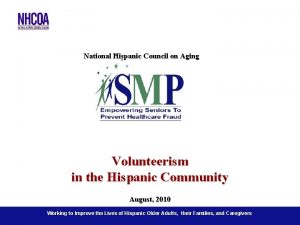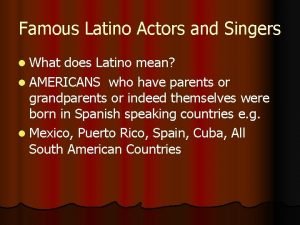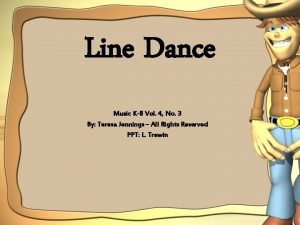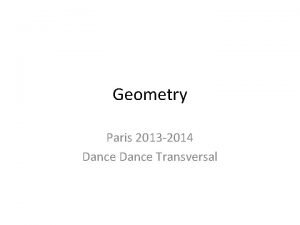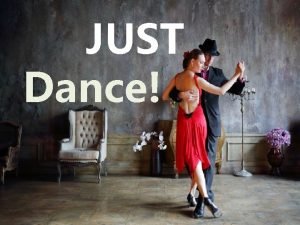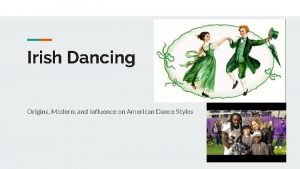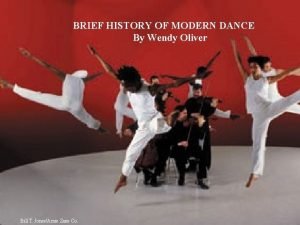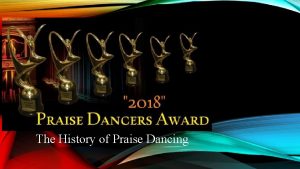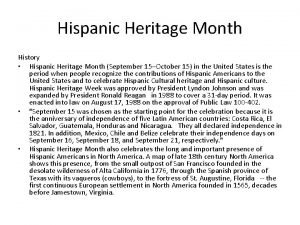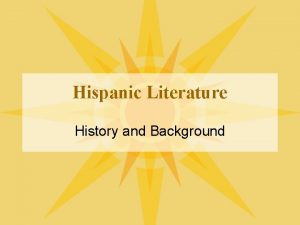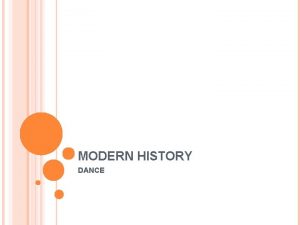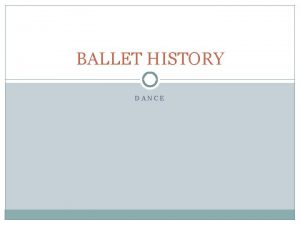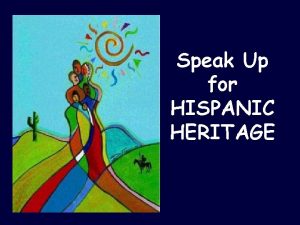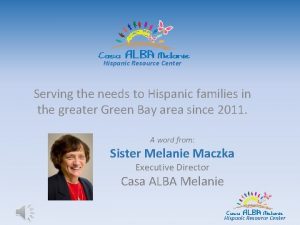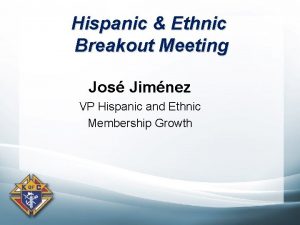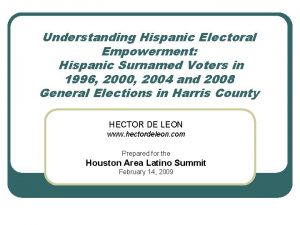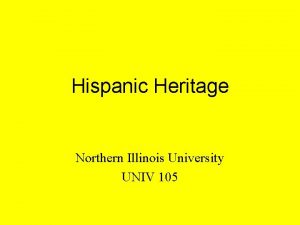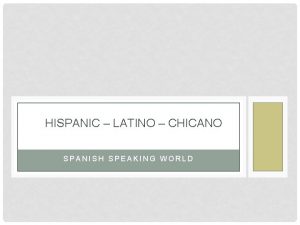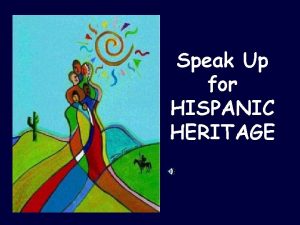DANCE History of Hispanic Dance used as a


















- Slides: 18

DANCE.

History of Hispanic Dance used as a form of communication. In the 15 th century, dance began to change from serious to more free-moving motions. Folk dancing began to make history, not only in Hispanic regions but gained recognition internationally.

Sara Baras Mother began teaching her dance in her own studio. Apprenticeship as flamenco dancer with Los Ninos de la Tertulia Flamenco. She was showcased in the Town Hall Theater in New York. Awarded Madrono Flamenco “most outstanding artiste of the year” Performed in front of the Queen of Spain Labeled as the “New Queen of Dance”

Traditional Hispanic Dances Jota Aragonesa Bolero Serdana Fandango Muneira Paso doble Zambra Flamenco Sevillana

Paso Doble Double-Step-every second step is emphasized Marching-like steps; comes from French military march-Paso Redoble Full of energy, strict and powerful Fastest style dance- 130 steps per minute Man= Torero Woman= “capa” red cloth Secretive dance; danced from the origin Usually only professionally danced; acting out a specific story

Flamenco 18 th century; Influenced from Greek, Roman, Indian, Moorish and Jewish cultures. Result of absorbing and sewing together diverse cultures. Over 50 types of Flamenco dance Personal improve through expression of performer's emotions with strict framework of flamenco music’s traditions and rhythmic patterns.

Hispanic Music History of Spanish music often varies from region to region. All are different, but mainly centered around the classic guitar. Music of Spain is often associated with traditions like Flamenco, Tango, and the classical box guitar. Hispanic music has played an important role within the shaping of music, especially within the 15 th-17 th centuries.

Carlos Santana Born 1947 in Jalisco, Mexico. Managed to outlast 1960’s, 70’s, 80’s, 90’s, and 00’s. Probably the most successful music career to come from Mexico Over 50 albums, not including albums made with “The Santana Band” Complete Clothing line, Line of custom Guitars, along with numerous charities and foundations.

Jose-Luis Orozoco Bilingual educator, children’s author, and recording artist. He has recorded 13 volumes of Lírica Infantil, Latin American Children's Music, and written three successful, award winning books In the spring of 2009, Jose-Luis received recognition and was honored by the Association of Bilingual Directors affiliated with the Los Angeles County Office of Education

History of Hispanic Theatre in Spain Religious Plays presented on Carros (wagons) Theatre in Madrid and Seville Comedia: full length play Three acts Theatre in Mexico Public theatres called Corrales Aztecs theatre: music & dance 17 th and 18 th Century: Spanish Invasion 19 th and 20 th century: � � � decline in theatre due to war Styles: Spanish Classicism, romanticism, nationalistic ideas Realism & experimental plays

Spanish Dramatists/Playwrights from the 16 th Century Miguel Cervantes: Don Quijote � The Siege of Nurmanas � The Traffic of Argel � The Fortunate Ruffian � Lope de Rueda author/dramatist considered best in his era Works: The Frauds, Medore, Aumelina, and Eufemia

Mexican/South American Dramatists/Playwrights Carlos Solórzano Most important playwright in Guatemalan history His plays are allegorical Reasons for man’s existence Las manos de Dios (1957), El crucificado (1957) Rodríguez Galván (1816 -1842) First Mexican romantic writer Plays/writing based on political issues Works: Profecía de Guatimoc, Al baile del señor Presidente

History of Hispanic Visual Art Hispanic art has a long and colorful history. Some of the earliest pieces of art, especially sculpture, have been found on the Iberian peninsula dating back to the Neolithic period. Since then, Spanish art traditions have influenced cultures all over the world. Between the 16 th and 19 th centuries, the Catholic Church brought religious sculptures and paintings with them to the southwestern US, Mexico, and Latin America. Local Hispanic artists then created small religious paintings and sculptures.

Pablo Picasso Pablo Picasso was born on October 25, 1881 in Malaga, Spain. In 1901, Picasso started a magazine called “Arte Joven” which he completely illustrated the first edition. His real career as a painter began around 1894 with the painting “The First Communion”. Pablo Picasso died on the 8 th of April, 1973 while he and his wife Jacqueline were entertaining friends for dinner. His last words were: ‘Drink to me, drink to my health, you know I can’t drink anymore. ’

Fernando Botero Fernando Botero was born on April 19, 1932. Botero is a Columbian artist known for his paintings and sculptures of inflated humans and animal shapes. When he was a teenager he began painting and was inspired by the pre-Columbian and Spanish colonial art that surrounded him. His own paintings were first exhibited in 1948 He moved to NYC in 1960 and developed his trademark style- bloated humans and animals.

Frida Kahlo Frida Kahlo was born in Mexico City, Mexico on July 6, 1907. Frida began painting after being injured in a severe bus accident. She is best known for her self portraits which often displayed the suffering in her life experiences.


Citations http: //www. buzzle. com/articles/pablo-picasso-biography. html http: //www. biography. com/articles/Fernando-Botero-241190 http: //www. infoplease. com/biography/var/fridakahlo. html http: //www. ehow. com/facts_6780280_history-hispanic-art. html "History of Mexican Theatre. " e. How, 2011. Web. 20 Sept. 2011. <http: //www. ehow. com/ facts_5580113_history-mexican-theatre. html>. Robinson, Scott R. "Spanish Theatre to 1700. " CWU Department of Theatre Arts. N. p. , 2010. Web. 20 Sept. 2011. <http: //www. cwu. edu/~robinsos/ppages/resources/Theatre_History/ Theahis_7. html>. http: //en. wikipedia. org/wiki/Carlos_Solórzano http: //en. wikipedia. org/wiki/Ignacio_Rodr%C 3%ADguez_Galván www. joseluisorozco. com www. santana. com/ en. wikipedia. org/wiki/Santana_(band
 We're gonna dance to one song
We're gonna dance to one song Hispanic cultural views on teenage pregnancy
Hispanic cultural views on teenage pregnancy National hispanic council on aging
National hispanic council on aging Hispanic american scientists
Hispanic american scientists Is hispanic an ethnicity
Is hispanic an ethnicity Is hispanic an ethnicity
Is hispanic an ethnicity Domestic violence in the hispanic community
Domestic violence in the hispanic community Most famous hispanic artists
Most famous hispanic artists Hispanic dude
Hispanic dude Famous latino actors
Famous latino actors Line dancing definition
Line dancing definition Everybody dance and sing line dance
Everybody dance and sing line dance Geometry bell ringers
Geometry bell ringers The dance committee hired a dj for the fall dance
The dance committee hired a dj for the fall dance Dancing as a hobby
Dancing as a hobby Jazz dance history
Jazz dance history Irish broom dance history
Irish broom dance history The history of modern dance
The history of modern dance Where did praise dancing come from
Where did praise dancing come from


